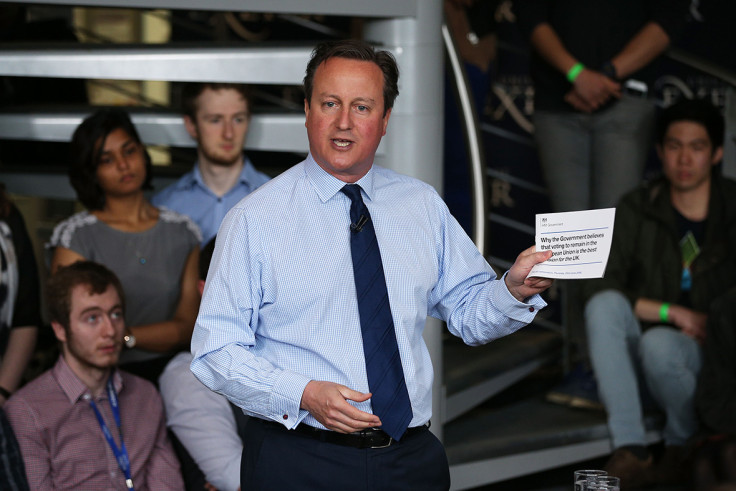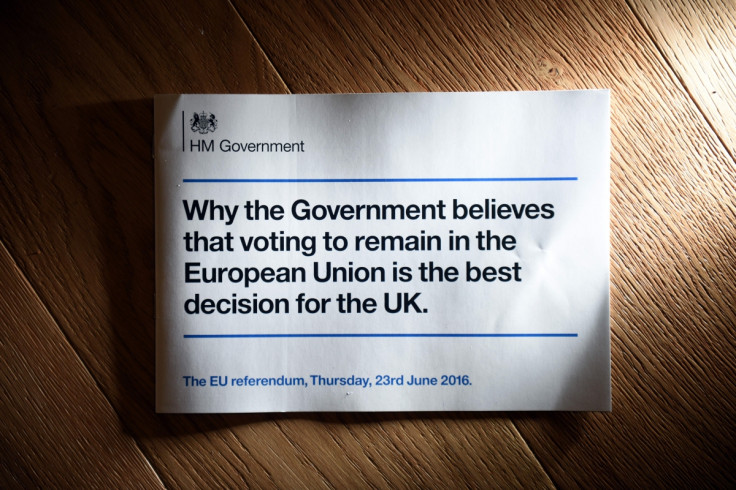A plague on both their houses: This pitiful EU referendum 'debate' is an affront to voters

Gosh, it's thoughtful of them isn't it? Just a couple of months before the most critical political decision we'll ever take, Her Majesty's Government is kindly helping us to make up our minds, with an outrageously expensive leaflet (paid for by us) explaining why we'd be barking mad even to consider leaving the EU.
Never mind the fact that David Cameron's negotiations failed to achieve anything like what he wanted in changing Britain's relations with Europe. Never mind the almost contemptuous way his demands were brushed aside. The Panglossian message in this propagandist exercise seems to be that all's still for the best, in the best of all possible worlds.
And so we are told that millions of British jobs are "linked" – note the implied menace – to our trade with Europe. Membership of the EU not only brings "economic security, peace and stability" but "magnifies the UK's ability to get its way on the issues we care about". We're winning the European game hands down, we're assured, so we'd better not vote to leave. Or else.
Ah, yes. The oldest tactic in the book. Project Fear. Hardly a day goes by without the invention of some new terror that might follow a Brexit. "Woe, woe and thrice woe," cries Cameron, like the demented old soothsayer in Up Pompeii. Leaving would be a "leap in the dark", he warns. It would be an "enormous economic gamble", proclaims Chancellor George Osborne. We would, says Environment Secretary Liz Truss, be entering a "Twilight Zone". Ooh, err!
Like the fat boy in Pickwick Papers, some even attempt to make our flesh creep by suggesting that leaving might provoke terrible acts of revenge from a spurned Europe. So the nation that stood up to Philip ll of Spain, Napoleon, Kaiser Bill, Adolf Hitler and Joseph Stalin is now invited to cower before the supposed wrath of Jean-Claude Juncker.
Now, conveniently on cue, here comes the International Monetary Fund (IMF) – home to some of the world's worst economists – to warn that a Brexit could lead to dire consequences for Britain, Europe and other nations. And of course Osborne immediately seeks out the nearest TV camera to agree with every apocalyptic word.
Yet Osborne wasn't always a fan of an IMF which has a habit of getting it wrong. Only three years ago he rightly derided the Fund for its silly suggestion that his austerity programme risked disaster. Since then, of course, Britain has created more jobs than all other nations of the EU combined. It's somewhat curious then that he now places so much weight on IMF opinion. Maybe Brexiteers aren't being entirely paranoid when they suspect collusion between the Fund and the Treasury.
Sadly, the Remain campaign almost invites such conspiracy theories when it so relentlessly resorts to scaremongering, elisions, half-truths and statistical manipulation. Not since Harold Wilson's referendum in 1975 has the political establishment shown such obvious contempt for the intelligence of the voters. But that said, can the Brexiteers claim to be any better?
Put to one side the jockeying for supremacy between the various Leave groups, which seems unhappily reminiscent of the rivalry between the People's Front of Judea and the Judean People's Front, in Monty Python's Life of Brian. How many Eurosceptics, however committed, can pretend to be happy with the quality of argument put forward by their side?
We're asked to believe, for example, that we can reduce immigration by the simple expedient of taking control of our own borders. Really? But what about our obviously dysfunctional Home Office? What about the fact that nobody in that department seems to have the faintest idea of whether or not there have been cuts in the budget for the UK Border Force? What about the utter shambles of our asylum policy? What about the certainty of retaliation if we restrict the free movement of EU nationals?
The truth is that our immigration policy has been in a mess for years because of the ineptitude of successive British governments rather than because of anything imposed on us by the EU. The Brexit camp needs to come up with something other than mere assertions before it deserves to be taken seriously.

Even worse is its lamentable failure to explain precisely how Britain can free itself from rule by Brussels, while at the same time retaining free access to the European single market. Are we to be like Norway? Switzerland? Canada? Or something else entirely? I've no idea. Have you?
With a few exceptions – I can think of the MEP Daniel Hannan and the Justice Secretary Michael Gove – the Brexiteers have not only failed to convince, but failed to rise above the plodding inanities on offer from the government side.
This isn't just an argument about jobs or trade or immigration, important though such concerns are. It's also about who we are, who we perceive ourselves to be, whether we should govern ourselves and what it means to be free, things that were once thought worth any sacrifice.
Well, perhaps times have changed. Perhaps for the better. But the old questions about democratic legitimacy still demand an answer: what gives you the right to tax me and tell me what to do? And how can I get rid of you?
Sadly, the answers in Europe are by no means clear. And even more sadly in this pitiful debate the questions aren't even being asked.
Michael Toner is a former Fleet Street political editor and co-author of a series of Bluffers' Guides on Europe. Follow him on Twitter: @Toner_Mick
© Copyright IBTimes 2025. All rights reserved.






















